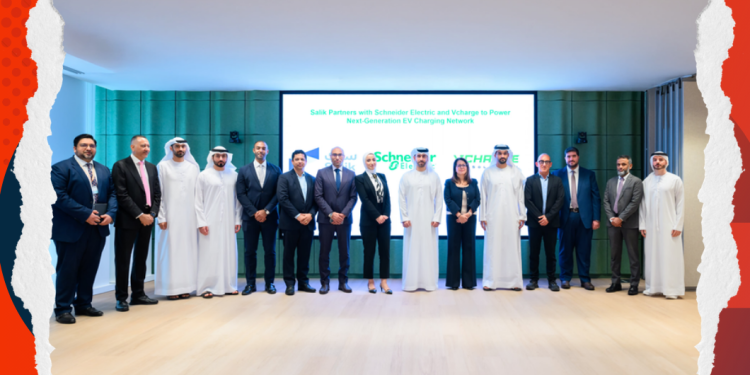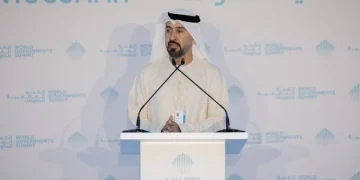Dubai’s toll operator, Salik, just signed a deal that could change how electric car owners charge their vehicles across the UAE. The company partnered with Schneider Electric and charging specialist Vcharge to build 1,800 smart charging stations nationwide.
The project connects charging payments directly to Salik’s digital wallet, eliminating the need for separate apps or registration processes.
Electric vehicle owners can plug in and pay through their existing Salik accounts. No more juggling multiple charging apps or carrying special cards. The system launches as the UAE’s electric vehicle market climbs toward a projected AED 7.16 billion by 2025.
Smart Payment System Simplifies EV Charging Experience
The collaboration brings together Schneider Electric’s advanced charging technology with Salik’s payment platform. Vcharge handles the technical aspects, including installation, software integration, and ongoing maintenance across all locations.
“This reflects Salik’s role in shaping mobility through innovation and customer-focused solutions,” said Ibrahim Sultan Al Haddad, CEO of Salik Company. The integration supports the UAE’s Net Zero 2050 vision while making charging more convenient for drivers.
Abdulaziz Al Shamsi, CEO of Vcharge, described the goal as creating a “zero-hassle experience – arrive, plug in, go.” The stations will offer both fast and ultra-fast charging options to serve different vehicle types and user needs.
UAE Charging Network Expansion Accelerates Nationwide
The Salik partnership adds to a busy year for the UAE’s charging infrastructure. Dubai Electricity and Water Authority (DEWA) expanded from 740 charging points in March to over 1,270 by mid-2025, a 72% jump in just months.
DEWA signed multiple contracts during October’s WETEX exhibition. The authority partnered with Parkin to install 100 new chargers across Dubai malls, communities, and leisure spots. A separate deal with ENOC Group brings fast-charging to service stations throughout the emirate.
Abu Dhabi keeps pace through ADNOC Distribution’s plan to operate 500 high-power chargers by 2028. The emirate’s E2GO joint venture between ADNOC and TAQA targets 70,000 charging points by 2030.
Government Policy Supports Nationwide Charging Standards
The UAE’s Ministry of Energy and Infrastructure rolled out a national electric vehicle policy to unify charging standards. The ministry plans over 500 charging stations by end-2025, with standardized pricing set at AED 1.2 per kWh for DC chargers.
Cross-border charging corridors with Saudi Arabia and Oman are under development. The ministry selected Siemens technology for ultra-fast charging infrastructure along major highways connecting the emirates.
Federal coordination ensures compatible charging systems across all seven emirates. This prevents the fragmented networks seen in other countries, where different operators use incompatible payment systems or connector types.
Technology Partners Drive Innovation and Reliability
Schneider Electric supplies the core charging hardware through its regional network. The company’s smart charging technology adjusts power delivery based on grid conditions and user demand patterns.
Vcharge brings local expertise in installation and maintenance across diverse UAE locations. The company manages everything from shopping mall installations to highway corridor deployments.
The partnership leverages proven technology already operating in international markets. Schneider Electric’s chargers support multiple connector standards, ensuring compatibility with all electric vehicle brands sold in the UAE.
Market Competition Intensifies Among Charging Providers
The UAE’s charging market now includes multiple major players competing for market share. DEWA dominates Dubai through its Green Charger initiative, while ADNOC focuses on Abu Dhabi and northern emirates.
Private operators like Statiq recently expanded from India into the UAE market. International charging networks eye the region as EV adoption accelerates across the Gulf states.
Competition benefits consumers through better service quality and more convenient locations. Multiple operators prevent monopoly pricing while encouraging innovation in payment systems and charging speeds.
The Salik deal represents a new model where transport infrastructure companies enter the charging business. This trend could accelerate as parking operators, fuel retailers, and road authorities seek new revenue streams.
Infrastructure Investment Supports Climate Goals
The charging network expansion directly supports the UAE’s commitment to carbon neutrality by 2050. Transport accounts for roughly 23% of the country’s carbon emissions, making vehicle electrification crucial for climate targets.
Government incentives include free Salik tags for EV owners and dedicated parking spaces at shopping centers. These policies encourage adoption while the charging infrastructure catches up to demand.
Solar-powered charging stations are planned for multiple locations, connecting clean energy generation with electric mobility. Dubai Investments Park will host a major solar EV charging hub covering 100,000 square meters.
The UAE’s position as a regional business hub means that charging infrastructure investments benefit both residents and visitors. Business travellers and tourists expect reliable charging networks in major cities.














